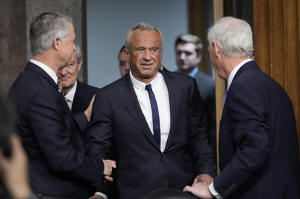What US adults think of Robert F. Kennedy Jr. and his views on vaccines,
fluoride and raw milk
 Send a link to a friend
Send a link to a friend
 [January 30, 2025]
By LINLEY SANDERS [January 30, 2025]
By LINLEY SANDERS
WASHINGTON (AP) — Robert F. Kennedy Jr.'s anti-vaccine advocacy is
outside the mainstream. His previous statements on abortion could
alienate Republicans. But a new poll finds that not all of his
controversial health goals are unpopular — in fact, at least one has
broad support among Democrats and Republicans.
As Kennedy's Senate confirmation hearings begin, his bid to become the
nation's top health official could depend on how staunchly he sticks to
these personal beliefs during questioning. He has already softened some
of his long-held views.
He's facing some skepticism from the public, according to a new survey
from The Associated Press-NORC Center for Public Affairs Research. Only
about 3 in 10 US adults approve of President Donald Trump nominating him
to be secretary of the Department of Health and Human Services. About 4
in 10 disapprove, while about one-quarter are either neutral or don’t
know enough to say.
But he has points of strength, too. Trump's choice of Kennedy is
especially popular among Republicans: About 6 in 10 approve, compared to
about 1 in 10 Democrats. And while many Americans disagree with some of
Kennedy’s controversial health stances — including beliefs around
reevaluating childhood vaccine recommendations and changing guidelines
around fluoride in drinking water and raw milk consumption — some of his
other stances, like reformulating processed foods, are broadly popular.
Here’s what AP-NORC polling shows about which of Kennedy’s priorities
are likely to be popular among U.S. adults and which might be less
well-received.

More oppose than support reevaluating widely used vaccines
Kennedy has long been a vaccine skeptic, and he and Trump have falsely
claimed that childhood vaccines are dangerous and tied to rising autism
rates. His opposition to vaccines is broad, and he has said that
“there’s no vaccine that is safe and effective.”
AP-NORC polling suggests that reevaluating vaccine recommendations would
be unpopular with many Americans.
About 4 in 10 Americans “strongly” or “somewhat” oppose reconsidering
the government’s recommendations around widely used vaccines, like the
flu vaccine, and about 3 in 10 are in favor. Another 3 in 10 Americans,
roughly, are neutral.
Republicans are more likely than Democrats to favor reconsidering
government recommendations for widely used vaccines, although their
support isn't overwhelming. About 4 in 10 Republicans favor reevaluating
vaccine recommendations, compared with about 2 in 10 Democrats.
Wide support for restrictions on ingredients in processed foods
One of Kennedy's ideas is popular across the board: getting some
chemicals out of processed foods. Kennedy has vowed to ban certain food
additives and crack down on ultra-processed foods that are tied to
obesity and diabetes rates.
About two-thirds of Americans “somewhat” or “strongly” favor restricting
or reformulating processed foods to remove ingredients like added sugar
or dyes. This is an area where Democrats and Republicans agree: About 7
in 10 in each group favor the restrictions.
Support is particularly high among U.S. adults with a higher household
income, though research from the National Institutes of Health has
indicated that ultra-processed foods are consumed at higher rates in
low-income groups. Roughly 8 in 10 adults with a household income of
$100,000 or more per year support the restrictions, compared with about
half of Americans with a household income of $30,000 or less.

[to top of second column]
|

Robert F. Kennedy Jr., President Donald Trump's choice to be
Secretary of Health and Human Services, arrives to appear before the
Senate Finance Committee for his confirmation hearing, at the
Capitol in Washington, Wednesday, Jan. 29, 2025. (AP Photo/Ben
Curtis)
 More oppose than support removing
raw milk restrictions
Kennedy indicated before the election that he would be keen to end
the Food and Drug Administration's “aggressive suppression” of raw
milk. The FDA and the Centers for Disease Control and Prevention
have called raw milk one of the “riskiest” foods people can consume
because of the possibility for contamination.
This is a proposal for which he'd have to do some convincing to get
the public on board. About 4 in 10 U.S. adults “strongly” or
“somewhat” oppose removing restrictions on the sale of unpasteurized
or raw milk. About 2 in 10 Americans favor this idea, with
Republicans being more likely than Democrats to be in support. But
even Republicans are split: About 3 in 10 are in favor, and about 3
in 10 are opposed.
Americans generally want Medicare and Medicaid to cover weight
loss drugs
Kennedy has criticized prescription weight loss drugs like Ozempic,
saying higher-quality food could solve the obesity problem in the
U.S., but in December he pivoted, saying the drugs “have a place” in
making sure people are not obese, in addition to lifestyle changes.
Americans see weight loss drugs as a good solution for adults who
are obese. About half of U.S. adults say it’s “very good” or
“somewhat good” for adults to use weight loss drugs if they are
struggling with obesity or a weight-related health condition. And
about half also favor Medicare and Medicaid covering the cost of
these drugs if they are prescribed for weight loss for people with
obesity.
More oppose than support removing fluoride from drinking water
Kennedy has said he wants the federal government to advise local
governments against putting fluoride in their drinking water. The
CDC has said small amounts of added fluoride in drinking water
prevent cavities and tooth decay.
More Americans are opposed than in favor of removing fluoride from
drinking water, but many don’t have an opinion on the issue, leaving
room for shifts in either direction. About 4 in 10 Americans oppose
removing fluoride from the water supply, and about one-quarter are
in favor. An additional one-third are neutral, saying they don’t
favor or oppose it. About one-third of independents and Republicans
favor it, compared with about 2 in 10 Democrats.

The idea of removing fluoride from drinking water is particularly
unpopular with adults 60 and older, and the data suggests that
younger Americans might be more open to it. About half of adults 60
or older oppose removing fluoride from the water, compared with
about 4 in 10 adults between the ages of 30 and 59. Only about 2 in
10 adults under 30 are opposed to this.
Kennedy’s views on abortion may be at odds with Republicans
Kennedy has previously expressed support for abortion rights, which
contradicts the beliefs of many of the Republican lawmakers who will
need to confirm him, though he has said that he will follow Trump’s
directives on the topic.
He's in a bit of a bind on the issue. About 6 in 10 voters in
November’s election said abortion should be legal in all or most
cases, according to AP VoteCast, a survey of more than 120,000
voters. About one-third said it should be illegal in all or most
instances. But like the Republican senators who will be questioning
him, conservative voters see the issue differently. Among Republican
voters, about 6 in 10 said abortion should be illegal in at least
“most” cases, and only about 4 in 10 said it should be mostly legal.
All contents © copyright 2025 Associated Press. All rights reserved |